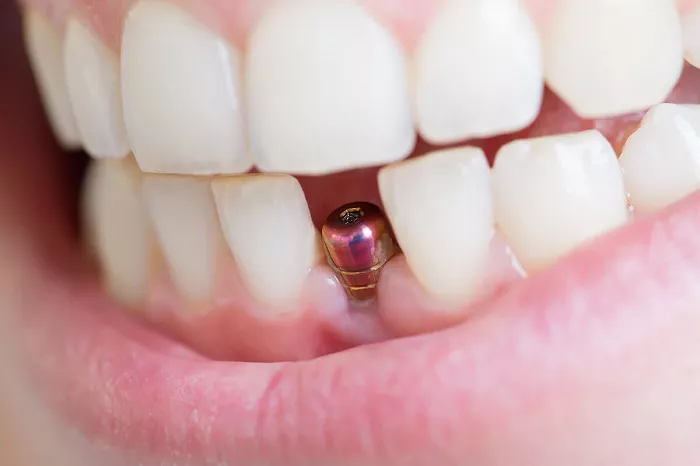In the realm of modern dentistry, dental implant crowns have emerged as a remarkable solution for replacing missing teeth, offering patients a functional and aesthetically pleasing alternative. However, one of the most common questions that patients have is, “How long does a dental implant crown last?” The answer to this question is not straightforward, as it depends on several factors that interact in complex ways.
Understanding Dental Implant Crowns
A dental implant crown is the visible part of a dental implant system that replicates the appearance and function of a natural tooth. It is attached to a titanium implant that is surgically placed into the jawbone, which acts as an artificial root.
This implant fuses with the bone through a process called osseointegration, providing a stable base for the crown. The crown itself is typically made of porcelain or a combination of porcelain and metal, chosen for its durability and ability to mimic the look of natural teeth.
Factors Influencing the Lifespan of a Dental Implant Crown
Material Quality:
The quality of the materials used in the fabrication of the crown plays a significant role in its longevity. High-quality porcelain crowns are more resistant to chipping and wear compared to lower-grade materials. For example, zirconia-based crowns are known for their excellent strength and durability, making them a popular choice in modern dentistry. They can withstand the forces of biting and chewing without easily fracturing. On the other hand, if a crown is made from a less durable porcelain or a metal alloy that is prone to corrosion, its lifespan may be considerably shorter.
Oral Hygiene Habits:
Maintaining proper oral hygiene is crucial for the long-term success of a dental implant crown. Just like natural teeth, implant crowns are susceptible to plaque and tartar buildup. If patients do not brush and floss regularly, bacteria can accumulate around the implant and the gum line, leading to inflammation and infection. This can cause the gums to recede, compromising the stability of the crown and potentially shortening its lifespan. For instance, patients who neglect to clean around the implant may develop peri-implantitis, a condition that can damage the bone supporting the implant and ultimately lead to the failure of the implant crown.
Biting and Chewing Forces:
The amount and nature of the forces exerted on the implant crown during biting and chewing can impact its durability. People who have habits such as grinding or clenching their teeth (bruxism ) place excessive stress on the crown and the implant. Over time, this can cause the crown to loosen, chip, or even fracture. Additionally, if patients regularly consume hard or sticky foods, it can also accelerate the wear and tear of the crown. For example, biting on ice or opening packages with the teeth can subject the implant crown to sudden and intense forces that it may not be designed to handle, leading to premature damage.
Overall Health and Lifestyle:
General health conditions and lifestyle factors can have an indirect but significant effect on the lifespan of a dental implant crown. Patients with underlying health issues such as diabetes or autoimmune disorders may have a slower healing process after implant surgery and may be more prone to infections, which can affect the stability and longevity of the implant.Smoking is another lifestyle factor that has been shown to have a negative impact. It can reduce blood flow to the gums and delay the healing process, increasing the risk of implant failure and reducing the lifespan of the crown.
Average Lifespan and Longevity Expectations
On average, a well-maintained dental implant crown can last anywhere from 10 to 20 years or even longer in some cases. However, this is a general estimate, and individual results may vary. Some patients may experience issues within the first few years if there are problems with the initial implant placement, such as improper angulation or insufficient osseointegration. In contrast, others may enjoy the benefits of their implant crown for several decades with proper care and regular dental check-ups.
Maintenance and Care for Prolonged Lifespan
Regular Dental Check-ups:
Patients should visit their dentist regularly, usually every 6 months, for check-ups and professional cleanings. During these visits, the dentist will examine the implant crown for any signs of wear, loosening, or damage. X-rays may be taken to assess the health of the bone around the implant and ensure that the osseointegration is intact. Any early signs of problems can be detected and addressed promptly, potentially extending the lifespan of the crown.
Proper Oral Hygiene:
As mentioned earlier, maintaining excellent oral hygiene is essential. Patients should brush their implant crown and the surrounding teeth at least twice a day using a soft-bristled toothbrush and fluoride toothpaste. Flossing or using interdental brushes is also important to clean between the teeth and around the implant, removing plaque and food particles. Additionally, using an antibacterial mouthwash can help reduce the bacterial load in the mouth and maintain gum health.
Avoiding Harmful Habits:
Patients should be aware of their biting and chewing habits and avoid putting excessive stress on the implant crown. This means refraining from habits like grinding and clenching teeth. If necessary, a nightguard can be prescribed to protect the implant crown during sleep. Also, patients should avoid consuming hard and sticky foods that can damage the crown.
Conclusion
In conclusion, the lifespan of a dental implant crown is influenced by a multitude of factors, including the quality of materials, oral hygiene practices, biting forces, and overall health and lifestyle. While the average lifespan can range from 10 to 20 years, with proper care and maintenance, it is possible to extend the longevity of the implant crown significantly. Patients who are considering dental implant treatment should be aware of these factors and work closely with their dentist to ensure the best possible outcome.

